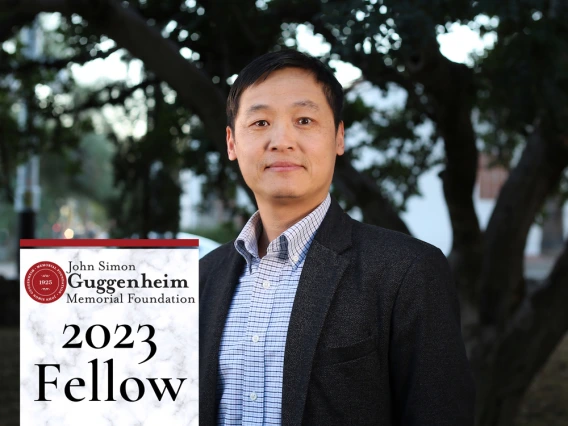
University of Arizona Department of East Asian Studies Professor and Center for Buddhist Studies Director Jiang Wu is one of 171 scientists, writers, scholars and artists awarded a 2023 Guggenheim Fellowship.
Wu said he was thrilled to be named a fellow and called the honor a "gratifying moment that comes after so many years of hard work and research."
"It is very special for me to receive this award, this year, because the subject matter I am researching is Buddhist canon brought by a Chinese monk, Yinyuan Longqi, in the 17th century to Japan – and this year is the 350th anniversary of his death," Wu said. "It is also the 150th anniversary of the Japanese Iwakura Mission to America and Europe, which facilitated the transfer of the reproduced Obaku Canon from Japan to the Indian Office Library in Britain. I am really happy with this result and thankful for university President Robbins, the College of Humanities, the Department of East Asian Studies and all of my wonderful colleagues for all the support I have received."
The John Simon Guggenheim Memorial Foundation was created and initially funded in 1925 by U.S. Sen. Simon Guggenheim of Colorado and his wife, Olga, in memory of their son, John Simon Guggenheim. The foundation works to "further the development of scholars and artists by assisting them to engage in research in any field of knowledge and creation in any of the arts, under the freest possible conditions." The foundation has granted nearly $400 million in fellowships to over 18,000 recipients.
The Guggenheim foundation's board of trustees approved fellowships representing 48 scholarly and artistic disciplines, with recipients hailing from 72 different academic institutions in 24 states, the District of Columbia and two Canadian provinces. Nearly 2,500 people applied for this year's fellowships.
Wu was awarded $60,000 to fund his project "Scripture and Modernity: The Obaku Buddhist Canon in East Asia and the West," an examination of the canon created in China and reproduced in Japan, which led to the founding of Ōbaku-shū, one of three major schools of Japanese Zen Buddhism originating in China. Wu said he plans to eventually turn the project into a book.
Wu added that his research can help develop a better understanding of humanity by examining religion and religious tradition.
"My study tackles the interaction and reaction of the religious world toward modernization, focusing on scripture," he said. "How does scripture become modernized? How does it become an expression, or a legacy of people's spirituality?"
Wu earned his bachelor's and master's degrees from Nankai University, and a doctorate from Harvard University in 2002 – the same year he joined UArizona as an assistant professor. Wu's research interests include 17th century Chinese Buddhism – especially Chan/Zen Buddhism – the role of Buddhist canons in the formation of East Asian Buddhist culture, and the historical exchanges between Chinese Buddhism and Japanese Buddhism. He is also interested in Confucianism, Chinese intellectual and social history, and the application of digital cultural atlas tools in the study of Chinese culture and religion.
Wu has published articles on a variety of topics in Asia Major, the Journal of East Asian History, the Journal of Chinese Philosophy and Monumenta Serica. His first book, "Enlightenment in Dispute: The Reinvention of Chan Buddhism in Seventeenth-Century China," was published in 2008. His book, "Leaving for the Rising Sun: Chinese Zen Master Yinyuan and the Authenticity Crisis in Early Modern East Asia," published in 2016, won the inaugural Tianzhu Best Book in Chan Studies Award. He was also awarded a Certificate of Congressional Recognition by U.S. Rep. Judy Chu of California and received the City of Rosemead, California, Award of Recognition in 2018.
"We're so pleased to see Jiang Wu recognized as a Guggenheim Fellow," said Alain-Philippe Durand, Dorrance Dean of the College of Humanities. "His expertise in Chinese Zen Buddhism and the Chinese Buddhist canon is internationally recognized and as the founding director of the Center for Buddhist Studies, he has helped position the University of Arizona as a hub for research and teaching. We are tremendously proud of the reputation that such exceptional scholars bring to the College of Humanities."
Albert Welter, Head of the Department of East Asian Studies, said Wu's fellowship is a "major accomplishment and recognition of Dr. Wu's world-class scholarship."
"Dr. Wu has been pioneering studies on the East Asian Buddhist canon for years and through his efforts, has established it as a major research area within Buddhist Studies," said Welter, whose research also focuses on Chinese Buddhism.
To celebrate the life and legacy of Longqi, the Center for Buddhist Studies and the College of Humanities are hosting a series of exhibitions, including art and history, through May.
Wu will speak as part of the University of Arizona Libraries Special Collections Early Books Lecture Series on April 18.

